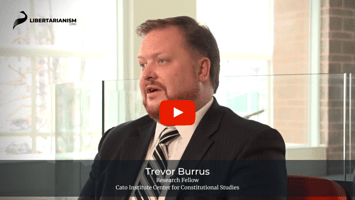Constitutionalism
Encyclopedia
Constitutionalism is the effort to impose a higher level order on the actions of government so that officials are not the judges of the limits of their own authority. Just as law is a limitation on action, a constitution limits the government’s actions and is therefore a “law for laws.” In the absence of a constitution, a state’s ruling power is ultimately arbitrary, and its decisions are matters of decree rather than of well-settled and generally understood principles. Such a society can provide little protection for individual rights, economic prosperity, or the rule of law.
Although some writers have defined the term constitution broadly enough to encompass any institution that helps constitute a society—including languages or religious traditions—the term is more precisely used to describe the political arrangements that set the terms under which a government operates. Constitutions can be written, as in the United States, or unwritten, as in England. Constitutionalism in the Western tradition began with ancient lawgivers such as Cleisthenes of Athens, who reorganized the city’s tribes and set rules for membership in the legislative body. The earliest known written constitutions, such as the Iroquois Confederacy or the Leges of San Marino, were much more like treaties or statutory codes that placed limits on government officials. The first written constitutions in the latter sense were probably those of Commonwealth England and the American colonies. The latter took either the form of royal corporate charters or improvised agreements such as the Mayflower Compact.
Constitutional government can be contrasted with government by decree; law is to arbitrary power as reason is to will: The distinction rests on whether the government’s action is based on some overriding and separately justified purpose or the product of simple ipse dixit; a mere assertion of power. Thus, there are three basic purposes for a constitution: (1) to impose stable and predictable limits on the state, (2) to ensure widespread understanding and debate concerning changes to those limits, and (3) to require that the government act on the basis of general public reasons, rather than arbitrarily for the private welfare of political insiders.
Nations with unwritten constitutions have often suffered from the fact that their ambiguity has allowed political authorities to expand their powers in novel and unpredictable ways—which, in turn, set precedents for future expansions of authority. For example, England suffered a major constitutional crisis in the early 17th century when James I and his successors asserted claims to absolute monarchy, including the power to rule without Parliament. This expression of royal power conflicted with the views of early Whigs, who believed that sovereign authority existed only when the King acted in conjunction with Parliament. The subsequent clash led to civil war, as well as to the adoption of many of the documents and principles that make up the present-day English Constitution, including the Petition of Right, the Bill of Rights, and the concept of parliamentary sovereignty.
Although the advent of written constitutions helps avoid or minimize such controversies, regimes where constitutions are frequently rewritten generally suffer the same or worse effects because the government becomes unstable and behaves unpredictably. This endangers individual rights and deters economic investment and innovation. Peru, for example, went through five constitutions in the 20th century—which is one reason for its well-documented political and economic woes. To avert this mutability, James Madison urged his countrymen to adopt an almost religious reverence for their Constitution.
If constitutionalism is to accomplish its purposes of limiting and stabilizing the political order, it is essential that the government actually comply with it. Regimes such as the Soviet Union had written constitutions that included explicit guarantees of certain individual rights, including freedom of speech. Yet the actual operations of the government were completely arbitrary, with no adherence to the constitution’s terms. Thus, the Soviet Union was a lawless regime, lending credence to Friedrich Hayek’s observation that a totalitarian state is one in which law has essentially been abolished.
In addition to predictability, constitutionalism helps to ensure that changes in the scope and nature of state power are subjected to widespread discussion before they are implemented and that such changes are as unambiguous as possible. Where the structure of government can be drastically altered without an orderly, openly discussed, and unequivocal change to the constitution, the legitimacy of such changes are open to doubt, and individual rights are threatened. Squealer’s midnight alterations to the Seven Commandments in George Orwell’s Animal Farm are a well-known dramatization of this principle. Another more recent example is the debate spurred by the contention of Bruce Ackerman and others that the expansion of federal power during the New Deal—and the Supreme Court’s decisions upholding that expansion—amounted to an unwritten amendment to the Constitution. But such “amendments”—enacted without formal popular consent— cannot be legitimately ascribed to the will of the people and set a dangerous precedent for manipulation of the Constitution by unelected elites.
James Buchanan has contended that one important role for a constitution is to restrain the possibility of legislation that redistributes wealth and opportunities between interest groups in society. A requirement that laws be generally applicable would eliminate lobbyists’ “incentive[s] for investment in efforts to secure differentially or discriminatorily favorable treatment.” James Madison saw this role as essential for the Constitution—if not the very definition of constitutional government: “In a society under the forms of which the stronger faction can readily unite and oppress the weaker, anarchy may as truly be said to reign as in a state of nature, where the weaker individual is not secured against the violence of the stronger.” Early in American history, the Due Process Clause was, in fact, read as a generality requirement under the theory of “substantive due process,” and Cass R. Sunstein, otherwise unsympathetic to libertarian constitutionalism, has contended that it is “focused on a single underlying evil: the distribution of resources or opportunities to one group rather than another solely on the ground that those favored have exercised the raw political power to obtain what they want.” However, as Anthony de Jasay has argued, such a requirement is insufficient because just as legislative majorities may seek to influence the legislature for their own benefit, so they will seek constitutional regimes that will maximize the possibility for such legislation. The New Deal’s relaxation of Due Process requirements is best seen as a step in this direction.
Because different constitutional interpretations will yield different conclusions regarding the limits of government power, debates over interpretation are often highly charged political matters. In the United States, libertarian constitutionalism tends to emphasize originalism or textualism—the first referring to the view that the constitution should be interpreted consistent with the way it was understood at the time of its ratification and the latter having reference to the view that the constitution should be interpreted strictly according to its text, rather than through broad interpretations of its terms. “Living constitutionalism,” by contrast, tends to be embraced by those who support an expanded government role that would allow it to reach beyond the Constitution’s explicit limits. Expansive readings of the Commerce Clause, for instance—which was originally intended as a limited grant of federal authority— currently authorize the federal government to act virtually at will with respect to any matter connected with commercial enterprise in even the most attenuated way, thus replacing orderly constitutional government with a government that can determine the scope of its own powers. Hence, Roger Pilon has described such interpretive theories as “politics trumping law.”
Libertarian constitutionalism descends from the theories of James Madison and other classical liberals, whose views were taken up by John Quincy Adams, his protégé Charles Sumner, and other abolitionists and Radical Republicans of the Civil War era, including Lysander Spooner, Gerrit Smith, and Frederick Douglass. These Republican constitutionalists embraced natural rights-based theories to argue that protecting individual freedom is the leading goal of the constitution’s limitations. These thinkers tended to emphasize the Declaration of Independence as a reference point for interpretation—or even as a binding legal document—a theory that has recently been called liberal originalism.
Republican constitutionalism was explicitly adopted in the 13th, 14th, and 15th Amendments, although these were severely undermined by decisions of the contemporaneous Supreme Court, such as The Slaughterhouse Cases. Although writers such as Eric Foner and Paul Kens describe this Republican constitutionalism as a facet of “Free Labor Ideology” and contend that it was devised in the 19th century as an ideological rationalization for capitalism, it in fact descended directly from the views of Madison, James Wilson, and other prominent constitutional framers. What was truly innovative and a challenge to the natural rights understanding of the Constitution was the view that it was a treaty between sovereign states. This theory was pioneered by such thinkers as John Taylor and John C. Calhoun and later defended by paleo-libertarians, who contended that state sovereignty would help check the expansion of federal power. The best primer on most aspects of modern libertarian constitutionalism is Randy E. Barnett’s book Restoring the Lost Constitution.
The underlying premise of Republican, and later libertarian, constitutionalism is that liberty takes precedence over democracy. This notion is consistent with the Constitution’s unambiguous description of liberty as a “blessing” and the fact that in many particulars it limits the power of democratic majorities. Democracy is regarded as an instrumental good, justified only insofar as it is consistent with liberty. Libertarian constitutionalism emphasizes natural rights, which are incorporated into the Bill of Rights, through the Privileges or Immunities Clause of the 14th Amendment and by the 9th Amendment’s reference to “other” rights beyond those explicitly listed. Libertarians reject the view that government is the source of rights and contend that it is only a mechanism for protecting rights that arise from an independent source. Therefore, government may not simply cancel such rights or create new ones by fiat that conflict with natural rights. The fact that natural rights are innumerable and that the 9th Amendment forbids the reading of the Bill of Rights as exhaustive requires courts to presume in favor of individual freedom when lawsuits are brought challenging the constitutionality of laws. This view contrasts with currently prevailing jurisprudence, under which most laws are presumed to be constitutional until they are proven inconsistent with explicit constitutional rights.
Although originally retarded by hostile Supreme Court decisions, important parts of Republican constitutionalism managed to prevail in the form of “substantive due process,” beginning with Loan Association v. Topeka decided in 1874, Hurtado v. California in1884, and Lochner v. New York in 1905. These cases embraced the view that, because government exists to provide for the general public welfare, any law that promotes only the private welfare of particular groups, for no general public reason, is a mere act of force or will and, therefore, not a “law.” Thus, any law that takes property from A and gives it to B simply because B has greater political power, or because the legislature wished to confer a benefit on B, cannot qualify as “due process of law” and violates the 14th Amendment.
By the early 20th century, the Progressive theories of living constitutionalism and legal positivism—which reject natural rights and see law as simply the will of the lawmaker—have become increasingly popular. During the 1930s, the Supreme Court conclusively adopted them, abandoning substantive due process and natural rights almost entirely. Instead, the Court today generally defers to legislatures to such a degree that they are often free to act as they will, with little or no constitutional constraint. On the present Supreme Court, only Justice Clarence Thomas has explicitly endorsed a natural rights understanding of the Constitution, but his defense of the view that the Constitution is a league of sovereign states and his refusal to endorse substantive due process disqualify him as a true libertarian constitutionalist.
A constitution is sometimes said to represent the will of the sovereign. In the United States, where the people are sovereign and the Constitution is explicitly ordained by “the people of the United States,” the Constitution represents the basic agreement of the whole people—as distinguished from mere legislation, which only represents the agreement of the members of a particular legislature at a particular time. Thus, according to The Federalist, the judiciary is actually enforcing the will of the people—not overriding it—when it annuls a law that exceeds constitutional limits.
If a constitution is a higher order law that limits the legislative powers of the state, it must be drafted or authorized by some power other than the legislature. In his Notes on the State of Virginia, Thomas Jefferson declared that one of the leading defects of the Virginia Constitution at that time was that it could be altered by the legislature. This idea was problematic because a legislature could not have power to “pass an act transcendent to the powers of other legislatures,” such as a constitution. “The other states in the Union have been of the opinion that to render a form of government unalterable by ordinary acts of assembly, the people must delegate persons with special powers.” It was in this spirit that the federal convention of 1787 prepared, and special ratification conventions later approved, the U.S. Constitution. Moreover, the fact that it was not ratified by state legislatures made the 1787 Constitution an agreement of the whole people of the United States, as opposed to a league of sovereign entities, as were the Articles of Confederation. For Madison, this distinction was essential because “one of the essential differences between a ‘league’ and a ‘Constitution’ was that the latter would prevent subunits from unilaterally bolting whenever they became dissatisfied.” Thus, the fact that the Constitution is, in fact, a constitution and not a treaty is decisive in the question of whether secession is constitutionally permissible.
Further Readings
Ackerman, Bruce. We the People: Transformations. Cambridge, MA: Harvard University Press, 1998.
Amar, Akhil Reed. America’s Constitution: A Biography. New York: Random House, 2005.
Barnett, Randy E. “The Original Meaning of the Commerce Clause.” University of Chicago Law Review 68 (2001): 101–147.
Buchanan, James M. “Generality as a Constitutional Constraint.” The Collected Works of James M. Buchanan. vol. 1. Geoffrey Brennan, Hartmut Kliemt, and Robert D. Tollison, eds. Indianapolis, IN: Liberty Fund, 1999. 427.
Cooley, Thomas. A Treatise on Constitutional Limitations. Boston: Little, Brown, 1868.
De Jasay, Anthony. Justice and Its Surroundings. Indianapolis, IN: Liberty Fund, 1998.
Douglass, Frederick. “The Constitution of the United States: Is It Pro-Slavery or Anti-Slavery?” Frederick Doulgass: Selected Speeches and Writings. Philip Foner and Yuval Taylor, eds. Chicago: Lawrence Hill Books, 1999.
Gerber, Scott. To Secure These Rights: The Declaration of Independence and Constitutional Interpretation. New York: New York University Press, 1996.
Hayek, Friedrich. Law, Legislation and Liberty: Vol 2. The Mirage of Social Justice. Chicago: University of Chicago Press, 1978.
Kens, Paul. Justice Stephen Field: Shaping Liberty from the Gold Rush to the Gilded Age. Lawrence: University Press of Kansas, 1997.
Pilon, Roger. “How Constitutional Corruption Has Led to Ideological Litmus Tests for Judicial Nominees.” Nexus: A Journal of Opinion 7 (2002): 67–78.
Rosen, Gary. American Compact: James Madison and the Problem of Founding. Lawrence: University Press of Kansas, 1999.
Sandefur, Timothy. “How Libertarians Ought to Think about the U.S. Civil War.” Reason Papers 28 (2006): 61–83.
Schor, Miguel. “Constitutionalism through the Looking Glass of Latin America.” Texas International Law Journal 41 (2006): 1–37.
Sunstein, Cass R. “Constitutionalism after the New Deal.” Harvard Law Review 101 (1987): 421–510.
———. “Naked Preferences and the Constitution.” Columbia Law Review 84 (1984): 1689–1732.

















